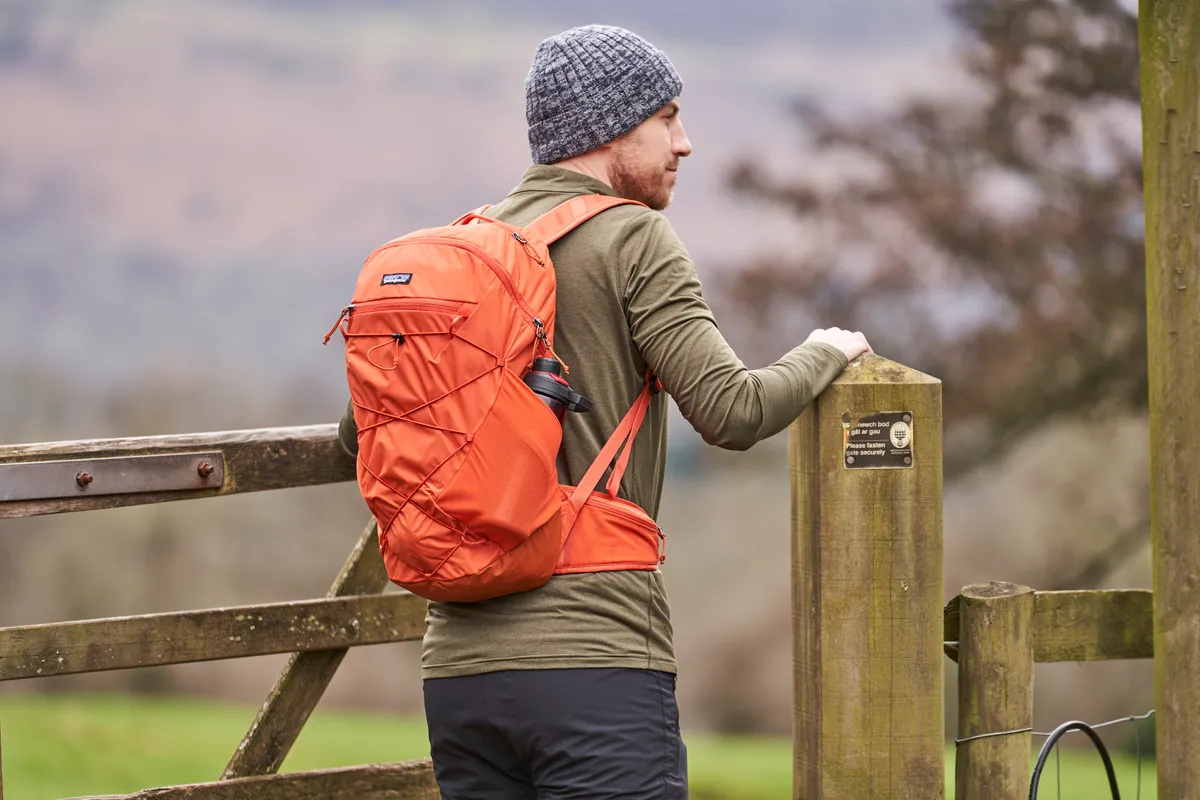The trusty daypack is an essential piece of kit for beach trips, walks, holidays, picnics and daily commutes, and finding a comfortable and well-fitting design makes for a much smoother day out.
So, what kind of daypack are you looking for? A budget-friendly, lightweight model you can take on your daily dog walk, or a smart-looking, sturdy bag suitable for the office as well as the hills?
Here at BBC Countryfile Magazine, we've put a number of daypacks to the test to help you find a suitable match for your adventure of choice. We've assessed how well the daypacks handle outdoor life, taking durability, storage, technical features, comfort and budget into consideration.
You can head to our short buyers' guide for more on what to consider when buying a daypack.
Best daypacks at a glance:
- Fjällräven Skule Top 26 - check availability at SportsShoes
- Cotopaxi Luzon 24L - check availability at Cotopaxi
- Quechua Hiking Backpack 23L - check availability at Decathlon
The daypacks below are ideally suited to day trips and casual, daily use rather than more serious hikes. If you're looking for a more technical design, head to our review of the best hiking backpacks.
Best daypacks reviewed for 2025
Fjällräven Skule Top 26
Best for durability

- RRP: £105.00
- Volume: 26 litre
- Colourways: black, navy, patina green, deep forest
- Weight: 750g
Fjällräven is a big player in the world of backpacks, and the brand's Skule Top 26 boasts a hefty price tag, so there's a lot to live up to.
This daypack was first tested loaded to bursting point on a warm, long cycle ride and yet it often felt like it wasn’t even there. Firm but lightweight padded shoulder straps and a padded rear (both with air mesh) make it comfortable and effortless to carry.
Commuters may struggle with the relative lack of pockets and compartments, but the pack's roominess and durability make it a great choice for pretty much any outdoor pursuit.
Expensive, yes, but if you want a hardwearing, stylish pack to last you for years to come, the Skule Top 26 delivers on all fronts.
Pros: water-repellent, attractive design, tough, roomy
Cons: shortage of compartments might get annoying, drawstring tie in main compartment is unnecessarily complicated
For more, read our full review of the Fjällräven Skule Top 26.
Cotopaxi Luzon 24L
Best for dry day hikes

- RRP: £65.00
- Volume: 24L
- Colourways: Multi-colour (every pack is unique)
- Weight: 420g
Cotopaxi is renowned for its sustainably-made and colourful backpacks and we put the brand's Luzon 24L to the test. We found it offered decent comfort, thanks to ultralight mesh shoulder straps, and excellent internal storage. The water bottle side pockets are notably spacious which is sure to come in handy if you've got a large one litre design.
The daypack is made of 100% recycled nylon, and we were impressed with the design's durability on test. We travelled far with the Luzon 24L, taking it on flights, trains and numerous hikes, and had no bother with wear and tear on review. The bag is lightweight yet robust.
The only real downside is the impractical drawstring closure on top of the bag. While it allows for easy access if you're looking to quickly grab an extra layer, it's an impractical choice for year-round, wet weather walks, and there's no waterproof backpack cover to counteract this issue.
Pros: Good-looking design, sustainably-made, comfortable
Cons: Drawstring closure is impractical for wet weather
Read our full review of the Cotopaxi Luzon 24L.
Patagonia Altvia Pack 22L
Best for fast and light travel

- RRP: £109.95
- Volume: 22L
- Weight: 670g
If you're looking for a more hike-friendly daypack, Patagonia's Altvia Pack features a rain cover and a structured back panel, plus it's hydration bladder compatible. On test, the good-looking pack proved roomy enough to pack enough outdoor gear for a day out in the mountains.
We really appreciated the daypack's lightweight structure, and the bungee cord on the front is great for stashing extra layers. There are two zip pockets on the hip belt for easy access to emergency snacks and valuables.
We were pleased with the bag's eco-credentials, as the pack is made predominantly from recycled materials.
We'd say the side pockets are a little shallow, as on review we found our water bottle slid out a couple of times.
Pros: Comfortable, lightweight
Cons: No adjustable back, side pockets are a bit shallow
Read our full review of the Patagonia Altvia Pack 22L for more detail.
Quechua Hiking Backpack 23L
Best for commuting and daily use

- RRP: £39.99
- Volume: 23L
- Weight: 830g
- Measurements: 46cm x 28cm x 22cm
Quechua's 23L hiking daypack features a smart, boxy finish and on-trend roll top design — this is a pack you can take to the office as well as the park for a picnic. The design itself is on the heavier side at 830g, but we were instantly impressed with the bag’s support, with our heavy load feeling particularly light on review.
A real bonus is the storage, with ample room for stashing. There are 13 pockets overall, including a phone pocket on one of the shoulder straps and a padded laptop sleeve. There are two stretchy side panels which expand to cover your water bottle (our one litre design fitted well), and there's a full-length, vertical zip which makes packing and finding belongings a breeze.
We felt the padded straps were not as comfortable as they look, as rather than moulding to your back, they sit on top, due to the thickness of the foam. We wouldn't recommend this pack for long, serious hikes, but for daily use and short trips, you've got a good-looking, well-designed pack on your hands.
Pros: Durable materials, smart aesthetic for general use, excellent storage and organisation
Cons: Lack of technical features, not the most comfortable on test
Highlander Outdoor Venture Backpack
Best for value
Buy from Highlander Outdoor (£29.99)

- RRP: £29.99
- Volume: 20L
- Weight: 470g
- Measurements: 48cm x 27cm x 16cm
Highlander Outdoor's Venture Backpack is a budget-friendly option, well suited to those looking for an effortless, no-frills pack you can sling on your back with ease. The daypack's ripstop polyester material feels thinner than the exteriors of some of the more sturdier packs on review, and there's no frame, so we wouldn't recommend over-stuffing, but this means it's particularly lightweight, and we saw no damage on test.
As for the interior, there is one main compartment and a laptop sleeve, so you don't have any zipped security pockets or compartments to help separate items. This is fine if you're using the daypack for a beach trip or short walk, and just need a towel, water bottle and a few snacks to hand, but commuters and hikers will likely find the lack of pockets to be a drawback.
The front zipped pocket is a huge plus as it's a lot larger than average, essentially the full length of the bag, with enough room for snacks, sunglasses, maps and valuables.
Pros: sleek design, lightweight, comfortable shoulder straps
Cons: small water bottle pockets, lack of internal pockets
Deuter Speed Lite 17
Best for low-level summer hikes

Another budget-friendly option to consider, the Deuter Speed Lite 17 works well for casual walks in low-level settings. While it's not the most technical design, this 17L minimalist daypack is ideal for leisurely strolls or as a travel companion in warmer climes.
We found when carrying lighter loads, the pack was comfortable, but there's no adjustment beyond the standard shoulder straps. Elastic pockets on each side of the daypack hold water bottles securely in place.
It's also worth noting, the Speed Lite 17 is made using 100% recycled pre-consumer waste.
Pros: Good value, lightweight
Cons: Thin back panel, light on some features
Read our full review of the Deuter Speed Lite 17.
For more of our outdoor kit reviews, read our roundups of the best walking shoes and the best walking boots.
How we tested
In order to review the daypacks and assign a five star rating, we assessed the products using the following criteria:
- Comfort - how comfortable is the pack on your back? Are there adjustable shoulder straps? Is there any padding?
- Storage - are there specific compartments for water bottles/laptops/hiking poles etc.? How many pockets are there?
- Additional features - are there any special features included to help the daypack stand out, such as whistles, rain covers and waist belts?
- Materials and durability - do the materials feel long-lasting? Does the bag feel sturdy enough to handle outdoor life? Have any sustainable materials been used?
- Value for money - are there enough technical features to justify a hefty price tag? Have high-quality materials been used?
What to consider when buying a daypack
Capacity
The daypacks on test here range from 15L to 28L, which work well for low-level hikes in the summer and casual day trips. Anything around the 20L mark should offer enough room for your essentials for the day ahead, such as an extra layer, waterproof jacket, food supplies, maps and valuables. If you want to travel fast and light for activities such as trail running, consider a daypack with a capacity of under 20L.
You may want to opt for a larger pack (25L to 35L) if you're planning to venture into more mountainous terrain in cooler climes, as you'll need additional safety equipment and layers.
Purpose
Daypacks are typically used for short hikes, commutes, day trips and cycling, and you'll find designs with specific purposes in mind, so it's best to think about what you'll be using your pack for before investing. If you're looking for a hiking daypack, features such as walking pole storage, in-built waterproof covers, a wide belt and decent ventilation are key.
Commuters on the other hand are going to be focused on laptop storage and internal compartments. If you're using the daypack for relaxed days out, one large compartment which lets you chuck the essentials in with ease as you head out of the door is sure to do the job.
Comfort
A key factor of course, especially if you're planning to fill your pack with heavier items such as water bottles, flasks and fruit.
While daypacks often feature adjustable straps, it's important to find a daypack that fits you well. If a pack digs into your hips, or causes chafing, it'll cause great discomfort, so try before you buy, and ensure the pack works for your shape.
Storage
Excellent internal and external storage can really help a daypack stand out. Being able to effortlessly locate your belongings and avoid the dreaded search party for that particular item makes for a much smoother, and less frustrating, day out.
Stretchy side pockets are useful for water bottles, while zip pockets on the belt are ideal for valuables, lip balms, hand sanitisers and maps. An easy-access large central pocket is particularly handy for wet-weather gear.
As for internal storage, you may want a laptop sleeve if your daypack is going to be used for work, and small security pockets with key clips are great for keeping your valuables safe.
For more luggage options, check out our review of the best weekend bags.

